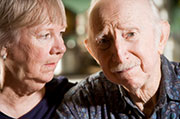- Could Your Grocery Store Meat Be Causing Recurring UTIs?
- Are You Making This Expensive Thermostat Error This Winter?
- Recognizing the Signs of Hypothyroidism
- 10 Strategies to Overcome Insomnia
- Could Artificial Sweeteners Be Aging the Brain Faster?
- Techniques for Soothing Your Nervous System
- Does the Water in Your House Smell Funny? Here’s Why
- Can a Daily Dose of Apple Cider Vinegar Actually Aid Weight Loss?
- 6 Health Beverages That Can Actually Spike Your Blood Sugar
- Treatment Options for Social Anxiety Disorder
Petty ‘Crimes’ Sometimes Tied to Dementia


Some older adults with dementia unwittingly commit crimes like theft or trespassing, and for a small number, it can be a first sign of their mental decline, a new study finds.
The behavior, researchers found, is most often seen in people with a subtype of frontotemporal dementia. Frontotemporal dementia accounts for about 10 to 15 percent of all dementia cases, according to the Alzheimer’s Association.
Meanwhile, older adults with Alzheimer’s — the most common form of dementia — appear much less likely to show “criminal behavior,” the researchers said.
Still, almost 8 percent of Alzheimer’s patients in the study had unintentionally committed some type of crime. Most often, it was a traffic violation, but there were some incidents of violence toward other people, researchers reported online Jan. 5 in JAMA Neurology.
Regardless of the specific behavior, though, it should be seen as a consequence of a brain disease and not a crime, experts said.
“I wouldn’t put a label of ‘criminal behavior’ on what is really a manifestation of a brain disease,” said Dr. Mark Lachs, a geriatrics specialist who has studied aggressive behavior among dementia patients in nursing homes.
“It’s not surprising that some patients with dementing illness would develop disinhibiting behaviors that can be construed as criminal,” said Lachs, who is a professor of medicine at Weill Cornell Medical College in New York City.
And it is important for families to be aware it can happen, Lachs said.
The findings are based on records from nearly 2,400 patients seen at the Memory and Aging Center at the University of California, San Francisco. They included 545 people with Alzheimer’s and 171 with the behavioral variant of frontotemporal dementia, where people lose their normal impulse control.
Dr. Aaron Pinkhasov, chairman of behavioral health at Winthrop-University Hospital in Mineola, N.Y., explained that this type of dementia affects a brain region — the frontal lobe — that “basically filters our thoughts and impulses before we put them out into the world.”
So it’s not surprising, he said, that of patients in this study, those with frontotemporal dementia had the highest rate of “criminal behavior” — at 37 percent. Theft, traffic violations, trespassing and inappropriate sexual advances were among the most common incidents in patients’ medical records.
Meanwhile, 8 percent of Alzheimer’s patients had shown such behavior. Most commonly, that meant a traffic violation, but there were 11 cases of violence and a few instances of theft. These included an elderly woman who “stole” a pie from her local grocery store due to confusion, and police were called.
Dr. Georges Naasan, one of the researchers on the study, said the legal issues can get tricky, particularly for people with frontotemporal dementia.
One reason is, they often seem “cognitively intact,” said Naasan, a neurologist and clinical instructor at the Memory and Aging Center.
His team found criminal acts were the first dementia symptom for 14 percent of study patients with frontotemporal dementia.
“They may be perceived by our current legal system as being ‘responsible’ for their action,” Naasan said.
For families, he said, alarm bells should sound if an elderly relative suddenly goes through behavioral or personality shifts. Dementia may or may not be the cause, Naasan added, but a medical evaluation “should at least be attempted.”
In contrast to frontotemporal dementia, Alzheimer’s tends to affect areas in the back of the brain, which means memory and visual-spatial skills take the biggest hit, Naasan said.
Pinkhasov said that when Alzheimer’s patients do develop behavioral problems or aggression, it’s usually when the disease is in a more advanced stage.
Naasan said that means it’s possible to prevent unintentional “crimes.”
“Maybe it’s time to stop driving even before a traffic violation happens, if there is suspicion that the patient’s judgment is clouded, and that behavior is impulsive,” Naasan said.
To avoid thefts, trespassing or other inappropriate behavior, he added, patients may need to be accompanied any time they leave home.
“The point is,” Naasan said, “these behaviors could be avoided with proper awareness, education and knowledge about the disease.”
More information
The Alzheimer’s Association has more on different forms of dementia.
Source: HealthDay
Copyright © 2026 HealthDay. All rights reserved.










